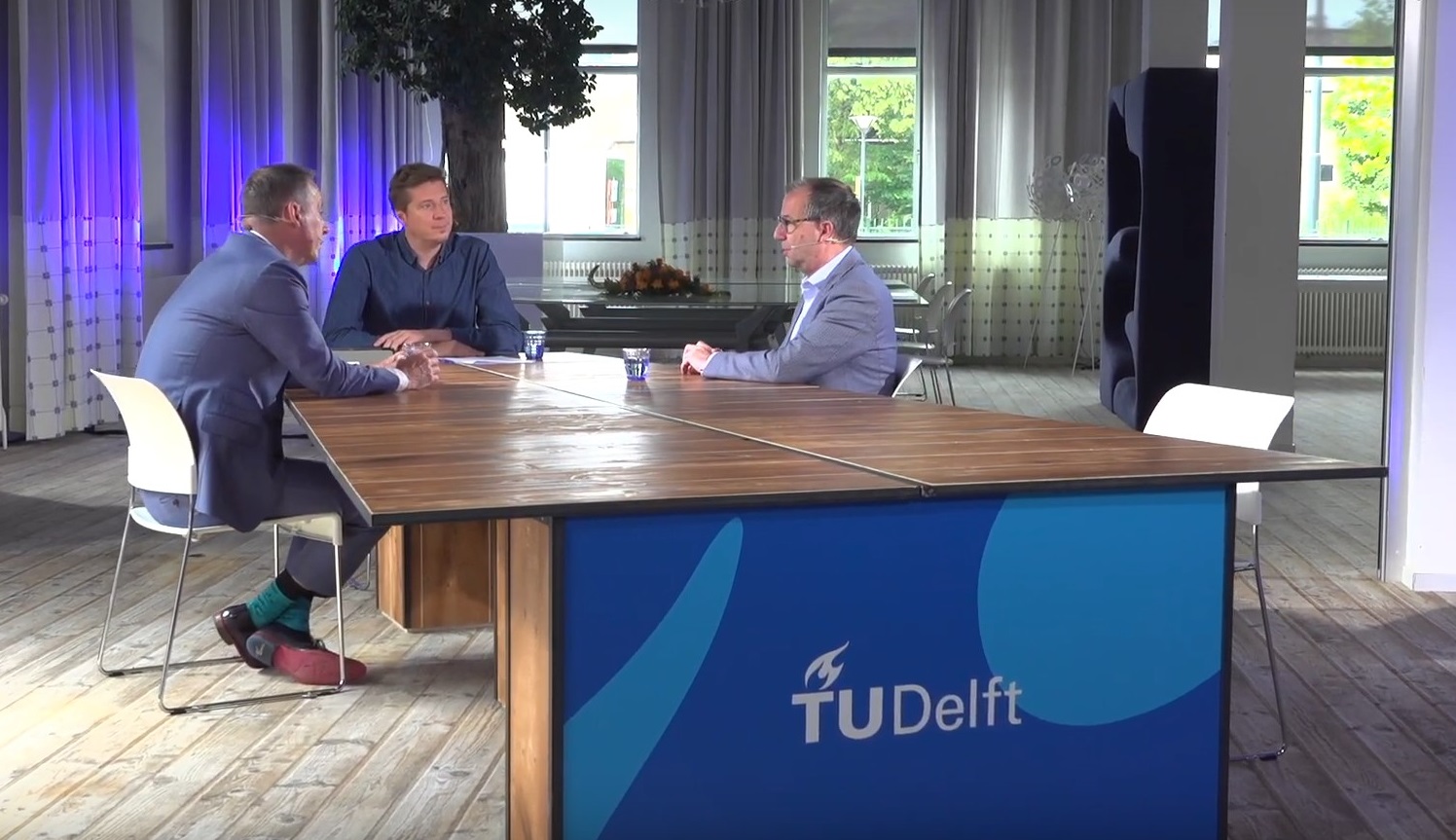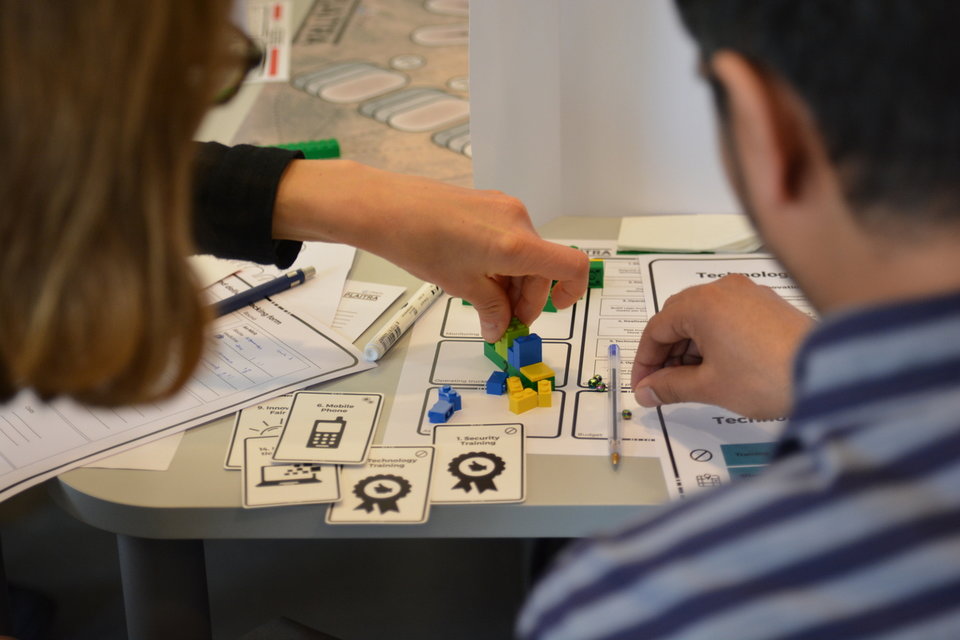Highlights for education TU Delft talkshow 24 June
During the online TU Delft talkshow on 24 June, the Executive Board and some members of the Strategic Response Teams, who have been looking at how we can stay on track to achieve our strategic goals despite the crisis, looked back at the past year and a half, and shared their ideas on what the world at TU Delft will look like after Covid-19.
In this article Rob Mudde, Vice Rector Magnificus/Vice President Education, repeats what that specifically means for the start of the academic year and for the future of our education.
What is the starting point for the start of the academic year?
"For the first quarter, we take the basic scenario, unless the number of infections rises sharply again. In the basic scenario, students can come to campus two to three days a week for education, social distancing is abandoned, and, in principle, a maximum of 75 people is allowed in a room (ed. excluding testing, exams and self-study). For the time being, we will continue to plan large lectures online because of the possible reintroduction of the one-and-a-half metre distance rule, on which the cabinet will make a decision on 13 August. You will hear the exact details via your own Faculty."
Is there a chance that we will scale up beyond the basic scenario for quarter 1?
"We realise that setting up teaching activities is not something you can turn around within two weeks to the optimal scenario where we have no measures at all. If the measures are relaxed further, as a lecturer, you have the freedom to provide more education on campus, provided it fits in the schedules that are currently made. We will deal with this on the level of our programmes and facilities. It may also be that some staff members do not want to or cannot come to campus for personal reasons. In consultation with the manager, a solution will be found. Of course, all this has to fit in with the measures and be feasible in organizational terms. We will scale up on a campus-wide basis at the earliest in the second quarter. For details concerning an individual student’s programme, I advice all students to try and follow e.g. the information on our web site and in Brightspace."
How do you think TU Delft education will develop in the near future?
"What we want to avoid is that after the summer we will pick up where we left off in September 2019. The corona crisis has taught us that sometimes we can spend time more usefully and that teaching and learning can be done differently and in better ways, with more freedom and flexibility than we were used to. The crisis triggered us to look even more seriously at blended education. Where can we add value by organizing things on campus, and what can be done online. The campus will remain a central meeting place for our community, both for formal and informal meetings. But online education will certainly remain a standard part of our teaching methodology.
Another issue that we need to address is the increase in the number of students. Do we give the same lecture twice in smaller groups, do we need even more larger classrooms on campus, or can blended education offer a solution for large groups?
The overwhelming amount of e-mail questions from students over the last year and a half was also interesting to see. It reminded us on the one hand of the importance of meeting your peer students, and led us on the other hand to the idea that we might consider organising processes more smoothly in order to support lecturers.
On the basis of these new insights, I think we will need the coming two years to investigate, discuss and experiment with each other, including students, what does and doesn't work and to adjust things accordingly."
What else will change?
"In terms of campus facilities, things can also be improved. Think, for example, of the creation of spaces at the university where students can follow online education. If we look back at the past period, where students tried to follow lectures from busy student houses, sometimes with poor Wi-Fi, we know that a quiet room with a good connection can make a huge difference to the experience for both students and lecturers. The hardware and software facilities of the lecture halls will also have to be reviewed. To make blended education possible, we will have to equip the teaching rooms with the right equipment."
Would students have received as much of the education as in previous years?
"That is a good question. If we compare the students' progress in terms of ECs with previous years, there is hardly any difference. Based on the results, we know that they did well in the exams. The question is whether they have processed and assimilated the material in the same way or whether there are gaps in their knowledge. Let's take a good look at that together and offer extra support where necessary."
How can we ensure that teachers and students find each other again?
"During the first quarter, we will need extra time and attention for community activities to re-engage students and lecturers. The incoming first year students, who may need more or a different kind of support on account of the past year, will need to get to know the campus, lecturers, fellow students and the guidelines. Besides this group, there is the group of prospective second-year students who have hardly been on campus last year. We should pay extra attention to them as well."
What do you expect if we soon have no more covid measures at all?
"The wellbeing of students and staff remains high on the agenda. We have to consider what will happen when the pressure is off for everybody. Will the problems be gone for all of us then? Probably not. When you are under pressure, you are able to keep going. It is precisely when the pressure is off that health problems could arise."
What do you expect from the return to campus?
Since 26 June, the working from home advice has been replaced by the advice to spend a maximum of 50% of the working week in the office. From 26 June onwards, the face mask requirement will only apply to groups where the one-and-a-half metre distance rule cannot be maintained. No testing or vaccination requirement will be introduced on the campus. The latest figures of the number of self-tests that have been ordered, show that as TU staff and students we are doing well. We are number 1 of the universities and only Fontys is doing better in absolute numbers within higher education!
We hope that employees will have returned to campus for about 60% of their working hours in September. It would be good for all, but especially for young and new employees, to be able to meet each other again in real life and share knowledge. Apart from contributing to social cohesion among employees, I think it would also be good for students to see professionals at work on campus. But before that happens, I would like to urge everyone to take a holiday. Close your laptop and enjoy the summer!
Have you missed the TU Delft talkshow on 24 June, watch it here!

